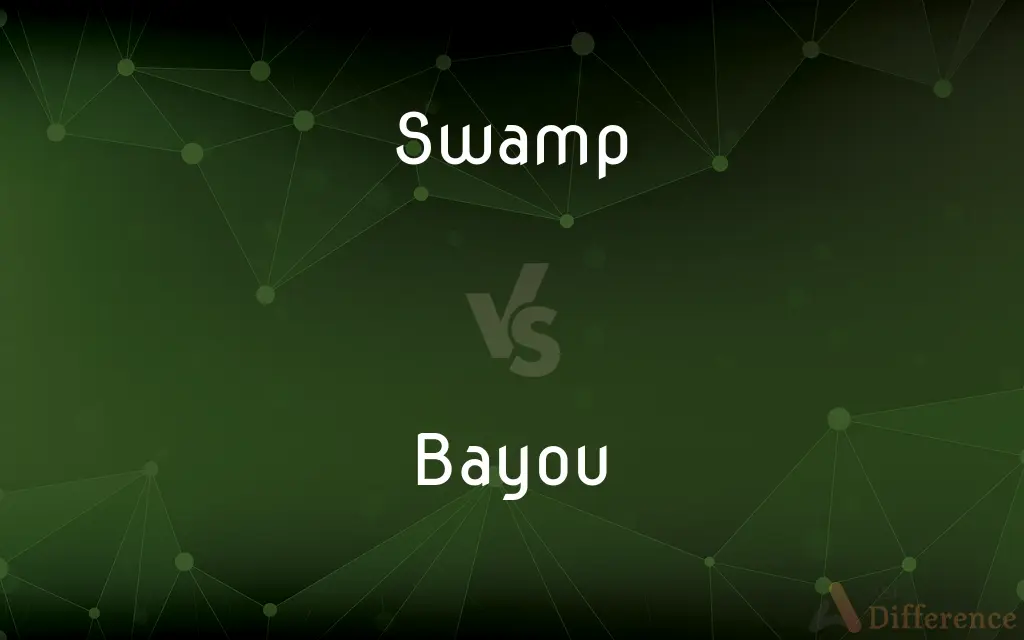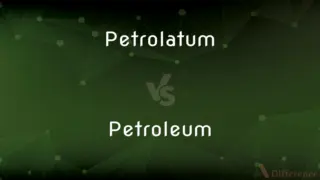Swamp vs. Bayou — What's the Difference?
By Tayyaba Rehman & Fiza Rafique — Updated on September 12, 2023
A swamp is a wetland with mostly stagnant water and a rich ecosystem, while a bayou is a slow-moving body of water, typically in a flat, low-lying area. Bayous are often an offshoot of a river or lake and are especially common in the southern U.S.

Difference Between Swamp and Bayou
Table of Contents
ADVERTISEMENT
Key Differences
Swamps are wetlands characterized by stagnant water and dense vegetation like trees and shrubs. Bayous are specific types of waterways, often slow-moving or stagnant, that are found mainly in low-lying areas and usually represent a tributary, secondary channel, or distributary of a river or lake.
While swamps may contain a variety of water bodies, including rivers and ponds, bayous are themselves a type of water body. Swamps are commonly found in many parts of the world, including both tropical and temperate regions. Bayous, on the other hand, are particularly associated with the southern United States, especially Louisiana.
Swamps often have a rich biodiversity, supporting a wide array of flora and fauna. Bayous also support varied ecosystems but are more known for their aquatic life, such as crawfish, alligators, and various fish species. They are usually brackish, containing a mix of saltwater and freshwater.
In popular culture, swamps are often seen as eerie or mysterious, perhaps owing to their dense vegetation and murky waters. Bayous also carry a sense of mystery but are more often romanticized, particularly in the folklore and music of the American South.
Comparison Chart
Type
Wetland
Waterway
ADVERTISEMENT
Location
Global, both tropical and temperate
Mostly southern United States
Water Movement
Generally stagnant
Slow-moving or stagnant
Biodiversity
Rich in flora and fauna
Rich in aquatic life
Cultural Image
Often seen as eerie or mysterious
Romanticized in southern U.S. folklore
Compare with Definitions
Swamp
A wetland with stagnant water.
The swamp was teeming with mosquitoes.
Bayou
A feature common in the southern U.S.
The bayou is a distinct feature of Louisiana's geography.
Swamp
A habitat rich in biodiversity.
The swamp is home to many bird species.
Bayou
A slow-moving waterway.
The bayou meandered through the flat landscape.
Swamp
A murky environment.
The swamp's murky waters hid many creatures.
Bayou
An offshoot of a river or lake.
The bayou branched off from the main river.
Swamp
A waterlogged area.
The swamp was difficult to navigate on foot.
Bayou
A habitat for aquatic life.
The bayou was teeming with crawfish.
Swamp
An ecosystem with dense vegetation.
The swamp was filled with tall reeds and trees.
Bayou
In usage in the Southern United States, a bayou () is a body of water typically found in a flat, low-lying area, and may refer to an extremely slow-moving stream or river (often with a poorly defined shoreline), a marshy lake or wetland or a creek whose current reverses daily due to tides, and which contains brackish water highly conducive to fish life and plankton. Bayous are commonly found in the Gulf Coast region of the southern United States, especially in the Mississippi River Delta.
Swamp
A swamp is a forested wetland. Swamps are considered to be transition zones because both land and water play a role in creating this environment.
Bayou
A body of water, such as a creek or small river, that is a tributary of a larger body of water.
Swamp
An area of low-lying land that is frequently flooded, especially one dominated by woody plants.
Bayou
A sluggish stream that meanders through lowlands, marshes, or plantation grounds.
Swamp
A lowland region saturated with water.
Bayou
A slow-moving, often stagnant creek or river.
Swamp
A situation or place fraught with difficulties and imponderables
A financial swamp.
Bayou
A swamp; a marshy (stagnant) body of water.
Swamp
To drench in or cover with or as if with water.
Bayou
An inlet from the Gulf of Mexico, from a lake, or from a large river, sometimes sluggish, sometimes without perceptible movement except from tide and wind.
A dark slender thread of a bayou moves loiteringly northeastward into a swamp of huge cypresses.
Swamp
To inundate or burden; overwhelm
She was swamped with work.
Bayou
A swampy arm or slow-moving outlet of a lake (term used mainly in Mississippi and Louisiana)
Swamp
(Nautical) To fill (a ship or boat) with water to the point of sinking it.
Bayou
Often brackish water.
The bayou contained a mix of saltwater and freshwater.
Swamp
To become full of water or sink.
Swamp
A piece of wet, spongy land; low ground saturated with water; soft, wet ground which may have a growth of certain kinds of trees, but is unfit for agricultural or pastoral purposes.
Swamp
A type of wetland that stretches for vast distances, and is home to many creatures which have adapted specifically to that environment.
Swamp
(figurative) A place or situation that is foul or where progress is difficult.
Swamp
To drench or fill with water.
The boat was swamped in the storm.
Swamp
(figurative) To overwhelm; to make too busy, or overrun the capacity of.
I have been swamped with paperwork ever since they started using the new system.
Swamp
(figurative) To plunge into difficulties and perils; to overwhelm; to ruin; to wreck.
Swamp
Wet, spongy land; soft, low ground saturated with water, but not usually covered with it; marshy ground away from the seashore.
Gray swamps and pools, waste places of the hern.
A swamp differs from a bog and a marsh in producing trees and shrubs, while the latter produce only herbage, plants, and mosses.
Swamp
To plunge or sink into a swamp.
Swamp
To cause (a boat) to become filled with water; to capsize or sink by whelming with water.
Swamp
Fig.: To plunge into difficulties and perils; to overwhelm; to ruin; to wreck.
The Whig majority of the house of Lords was swamped by the creation of twelve Tory peers.
Having swamped himself in following the ignis fatuus of a theory.
Swamp
To sink or stick in a swamp; figuratively, to become involved in insuperable difficulties.
Swamp
To become filled with water, as a boat; to founder; to capsize or sink; figuratively, to be ruined; to be wrecked.
Swamp
Low land that is seasonally flooded; has more woody plants than a marsh and better drainage than a bog
Swamp
A situation fraught with difficulties and imponderables;
He was trapped in a medical swamp
Swamp
Drench or submerge or be drenched or submerged;
The tsunami swamped every boat in the harbor
Swamp
Fill quickly beyond capacity; as with a liquid;
The basement was inundated after the storm
The images flooded his mind
Common Curiosities
What is a Bayou?
A bayou is a slow-moving or stagnant body of water, usually in a low-lying area.
What Type of Water is in a Swamp?
Swamps usually contain stagnant water.
Where are Bayous Found?
Bayous are primarily found in the southern United States.
What Lives in a Swamp?
Swamps support a wide range of flora and fauna.
What is a Swamp?
A swamp is a wetland characterized by stagnant water and dense vegetation.
Are Swamps Natural?
Most swamps are natural but can also be artificially created.
Where are Swamps Found?
Swamps can be found globally, in both tropical and temperate regions.
Are Swamps Freshwater?
Swamps can be freshwater, brackish, or saltwater.
What Type of Water is in a Bayou?
Bayous often contain slow-moving or stagnant, usually brackish, water.
Are Swamps and Bayous the Same?
No, swamps are a type of wetland while bayous are a type of waterway.
Can You Navigate a Bayou?
Bayous are often navigable by small boats.
What Lives in a Bayou?
Bayous are rich in aquatic life like crawfish, alligators, and fish.
Are Bayous Natural?
Bayous are generally natural waterways.
Are Bayous Freshwater?
Bayous are usually brackish, containing both saltwater and freshwater.
Can You Navigate a Swamp?
Swamps are usually difficult to navigate due to dense vegetation.
Share Your Discovery

Previous Comparison
Petrolatum vs. Petroleum
Next Comparison
Tendon vs. AponeurosisAuthor Spotlight
Written by
Tayyaba RehmanTayyaba Rehman is a distinguished writer, currently serving as a primary contributor to askdifference.com. As a researcher in semantics and etymology, Tayyaba's passion for the complexity of languages and their distinctions has found a perfect home on the platform. Tayyaba delves into the intricacies of language, distinguishing between commonly confused words and phrases, thereby providing clarity for readers worldwide.
Co-written by
Fiza RafiqueFiza Rafique is a skilled content writer at AskDifference.com, where she meticulously refines and enhances written pieces. Drawing from her vast editorial expertise, Fiza ensures clarity, accuracy, and precision in every article. Passionate about language, she continually seeks to elevate the quality of content for readers worldwide.













































